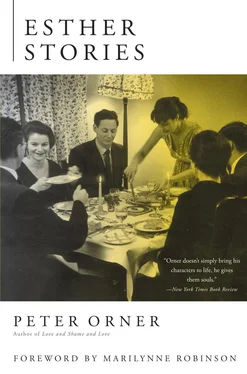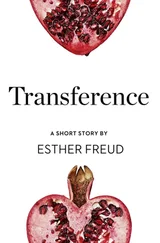Louie Shlansky was a gaunt, kind, terribly short-legged man with an acid tongue and no bite, who loved to tell stories on himself. They were all lies, worse than lies. Rachel called them perversions, but Louie loved to make people laugh; he didn’t give a damn how. Besides, his philosophy was that stories are more believable when yours truly is the punch line. Rachel, who was literal about everything, used to tell people, No, I was there the whole time, and nothing even remotely like that happened. But after the shakes attacked him, a little man, with such vengeance, she let him have whatever joys were left. It didn’t take much for her to hold her tongue while he blathered onward. Like his famous and always-more-stupid-than-the-last-time-he-told-it nonsense about the time the police mistook him for a ranking member of the Chicago branch of the Purple Boys. You want to know? I’ll tell you. You ever been to Bedlam? Two cops, Cheesus, running me down like I’m Jew Kid Grabiner. Look at me. I look anything like Jew Kid Grabiner to you? So I’m hightailing two miles, no seven, seven miles, before I fall down a manhole on South Halsted. The dumb paddies tumble in behind me, so the three of us are down there groping in the dark, and one of them goes, Anybody got a light? And I say, You kidding? I’ve got cigars! And the other cop says, See, I knew this guy was a Purple Boy, and they start whacking me with their sticks, and I’m shouting, Boys, boys, you got it all wrong, I’m a butter-and-egg man, I only do sundries on the side!
Behind his back and sometimes in front of it, his pals in Rogers Park called Rachel “the claw.” To them she was a fiend, a woman with moles on both cheeks the size of cow’s nipples. She was the local eyesore. But she was also, as everybody well knew, the brains (and the brawn) behind their operation. Louie was owner of Louie’s in name only. It was her place, and she’d lorded over it for more than twenty-five years from her post at the cash register. Then one day something happened, her brain clogged up, and she dragged Louie away, away to die in Arkansas. More bizarre is that she did it in the middle of some of the blackest days anybody’d ever seen. But Rachel, hard as she was, used to wail in her sleep after seeing him in such pain. She read in a pamphlet that the warmer climate and yes, the waters, the miracle thermal baths of Hot Springs, could ease some of the worst of symptoms, the ceaseless trembling, for one. She was a hard woman and maybe hideous to look at, his friends said, but she loved that man without embarrassment, which was more than they could say for their own wives. And though she spent much of their mutual working day berating him for his generosity (whenever she was in the back room, Louie smuggled groceries to people without writing it on a tab), everybody knew she babied him behind the closed doors of their apartment upstairs. She washed him; Louie Shlansky never slept on sheets that weren’t crisp. Rachel decreed it. Hot Springs. And they were going to open that café they talked about when they were first married, those days when their bodies were still young and unravaged. At first he protested: What about Bernice and the babies? And our customers? This block will starve. Is that what you want? To start another potato famine? This is how it started in Ireland. The best people left and then came the fungus.
She knew losing his audience alone might kill him. But what’s the use of an audience when all you’ve got is soil in your throat? “Imagine the shaking stopping,” she whispered fiercely. “Imagine it.” She stroked his cheek with the inside of her fist. They were in the kitchen. In the gloom of early morning in chill Chicago April. Outside, it looked the gloom of December. It was Sunday and the store would be shut all day in deference to the law, but they’d long made a habit of getting up at 5:45 every morning. He looked at her and didn’t exactly agree; surrendered would be a better word, since it wasn’t, finally, up to him. If she hadn’t shooed him away so she could swamp the floor, he would have told her he was grateful. He so rarely thought of himself, the self he didn’t invent. Strange to think that his comfort was so important you had to pick up and move a house.
In the kitchen that morning, he didn’t need to tell her he was grateful. She knew. In the ash light, she knew. She also knew that whatever she did, his was a fragile life; the move alone might kill him. But she would never be able to forgive herself for standing pat. Hot Springs. Lucky Luciano and Al Capone went there. Jack Dempsey. George Raft. Eleanor Roosevelt, too. The Illinois Central and the Chicago and Rock Island took the rich down there in sleeping cars. They came from the East Coast and Hollywood to promenade the clean white sidewalks and bathe. Rachel’s pamphlet said that at Hot Springs you were either about to take your bath, taking your bath, or just getting through with your bath. There were stories of cripples walking again, even running, climbing trees, after a day or two in those waters.
One week before they left, she gave a party in his honor. All of the 800 block of Fargo Avenue crowded into the flat above the store. Louie stood, as usual, inside the circle, his wine sloshing, telling about the time his secondhand zeppelin crashed into the Indian Ocean and he got rescued by a canoe-load of Potawatomi squaws who thought he was handsome and so scalped him for free even though their normal price was $3.50. “It’s why I have no hair,” he said. Rachel stayed in the kitchen, silent.
Her frivolous daughter, Bernice, the dancer, whirls in, balancing two glasses in each palm. Just had another baby, a daughter, Esther, and now look at her. Already slim and careless. Overdressed as usual tonight. Pearls in a year like this. Can you imagine? Bernice sets the plate and the glasses safely on the table, widens her eyes and implores, again, “This is madness. Look how happy—”
“What! I die for that man every day and you come here all tarty and—”
“Nobody else can love him?”
“How much did you pay for those pearls?”
“Hot Springs, Mother. You’ll make him a servant. The kind of money people throw around down there, you don’t understand.”
“I asked you never to speak of money in this house.”
“I can’t have an opinion. Only you can—”
“You bring shame.”
“Traipsing him off to a place he doesn’t know a soul? Him? Who loves nothing more than sitting on the stoop with Manny and Uncle Nort.”
“You don’t know.”
“How do you expect him to cook in some restaurant if he can no longer even work the stock in the store? Anyway, Seymour says he can find a place for him. That he can sit at a desk. He wanted me to tell you.”
Rachel’s face twitches, but she doesn’t roar. It’s as though she hasn’t heard this most terrible of all suggestions, that she accept her son-in-law’s charity. She looks at her feet and says quietly, even meekly, “The waters. You don’t know about the waters. The radioactivity enlarges the blood vessels. I read it.”
Bernice, too, looks down at her mother’s battered shoes. She knows she has a better pair in the closet, that she wore these for her, so that Bernice would be certain to see how poor, her struggles…Yet, even so, she can’t help being sucked in a little by her mother’s faith. It’s something she gave up on years ago, and about more things in her life than her father’s health. Nonetheless, it’s her mother. Bernice can’t stop herself from firing: “Your waters are a fraud, Mother, a cover for the gambling. Seymour says it got so bad a few years ago the mayor had to fire the entire police force. He also says everybody there has gonorrhea.”
“Seymour, Seymour, Seymour. Where’s Seymour, who loves your father so much?”
Читать дальше












